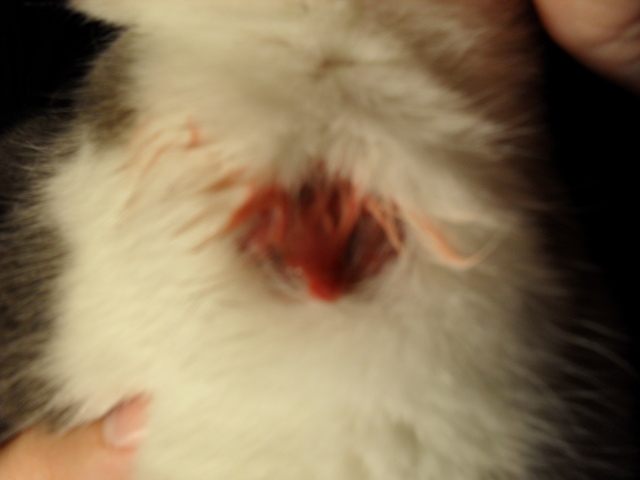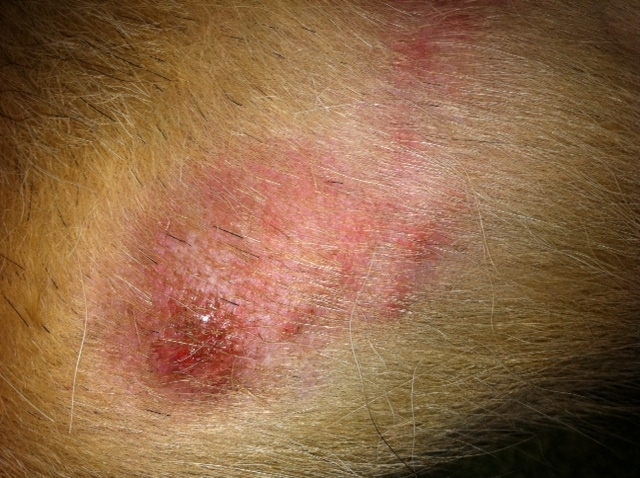QuestionMy 12 yr. old Minpin, who has had Pancreatitis for a couple of years is
becoming aggressive over food. On our vet's advice we changed her diet to
a vegetarian one at the time she was diagnosed. She eats napkins if left
where she can get them if they have a food smell on them. She tries and
succeeds taking food off of your plate if she can reach it. She even tried
to eat egg shells from the grandkids easter eggs. What is she missing in
her diet? Meat? Would that make her aggressive?
AnswerHi there! I would suggest that the aggression could be coming from hunger. Dogs are carnivores and need meat. Despite what your veterinarian said, I would have suggested the contrary. I don't know if you enjoy cooking, but boiled hamburger or chicken (with no spices!) with rice is the most excellent diet for a dog with pancretitis, as this is very easy to digest and soothing on the system.
How has the pancreatitis been treated? Aggression can also be a form of acting out in pain. She may be uncomfortable and need different medications/treatment.
Here is some information that may help you understand the disease better:
The pancreas is a vital organ which lies on the right side of the abdomen. It has two functions:
1)to produce enzymes which help in digestion of food and,
2)to produce hormones, such as insulin.
When the pancreas becomes inflamed, the disorder is called pancreatitis. It is a disease process that is seen commonly in the dog. There is no age, sex, or breed predisposition.
There are two main forms of acute (sudden onset) pancreatitis: 1) the mild, edematous form and, 2) the more severe, hemorrhagic form. A few dogs that recover from an acute episode of pancreatitis may continue to have recurrent bouts of the acute disease, known as chronic, relapsing pancreatitis. The associated inflammation allows digestive enzymes to spill into the abdominal cavity; this may result in secondary damage to surrounding organs, such as the liver, bile ducts, gall bladder, and intestines.
The cause of pancreatitis is not known; however, there may be several contributory factors. It is often associated with a rich, fatty meal. In some cases, it may be associated with the administration of cortisone; however, some dogs with pancreatitis do not have exposure to either.
Under normal conditions, digestive enzymes produced by the pancreas are activated when they reach the small intestines. In pancreatitis, these enzymes are activated prematurely in the pancreas instead of in the small intestines. This results in digestion of the pancreas itself. The clinical signs of pancreatitis are often variable, and the intensity of the disease will depend on the quantity of enzymes that are prematurely activated.
The diagnosis of pancreatitis is based on three criteria: clinical signs, laboratory tests, and radiographs (x-rays) and/or ultrasound examination. The disease is typically manifested by nausea, vomiting, fever, abdominal pain, and diarrhea. If the attack is severe, acute shock, depression, and death may occur. Laboratory tests usually reveal an elevated white blood cell count; however, an elevated white blood cell count may also be caused by many other things besides pancreatitis. The elevation of pancreatic enzymes in the blood is probably the most helpful criteria in detecting pancreatic disease, but some dogs with pancreatitis will have normal levels. Radiographs and ultrasound studies may show an area of inflammation in the location of the pancreas. Unfortunately, many dogs with pancreatitis will elude detection with any of these tests. Consequently, the diagnosis of pancreatitis may be tentative in some cases.
The successful management of pancreatitis will depend on early diagnosis and prompt medical therapy. The mild form of the disease is best treated by resting the pancreas from its role in digestion. The only way to "turn off" the pancreas is to withhold all oral fluids and food. This approach is accompanied by intravenous fluids to maintain normal fluid and electrolyte balance. In addition, anti-inflammatory drugs are sometimes administered. The presence of shock necessitates the immediate and intense use of intravenous fluids. Antibiotics are also indicated in many cases.
There are three possible long-term complications that may follow severe or repeated pancreatitis. If a significant number of cells that produce digestive enzymes are destroyed, a lack of proper food digestion may follow. This is known as pancreatic insufficiency and can be treated with daily administration of enzyme tablets or powder in the food. If a significant number of cells that produce insulin are destroyed, diabetes mellitus can result and insulin therapy may be needed. In rare cases, adhesions between the abdominal organs may occur as a consequence of pancreatitis. However, most dogs recover with no long-term effects.
The thing that concerns me is that you mentioned that your dog has had it for a couple of years. Did your veterinarian ever put her on intravenous fluids or antibiotics? If not, this would need to be done. She should have recovered from it shortly after treatment and if she is still showing these symptoms, perhaps she will need daily medications.
There may be something else, health related going on. A change in behavior often indicates discomfort.
I hope this was helpful and please keep me posted,
Hilary

 Tailed Manx Kitten docking tail?
QuestionQUESTION: Hello,
I got tailed manx kitt
Tailed Manx Kitten docking tail?
QuestionQUESTION: Hello,
I got tailed manx kitt
 Feral cat with bloated stomach
Question
Cats stomach
Hello,
Id like some help with a
Feral cat with bloated stomach
Question
Cats stomach
Hello,
Id like some help with a
 My Cat Has some kind of abrasion
Question
The abrasion
I noticed my cat had some
My Cat Has some kind of abrasion
Question
The abrasion
I noticed my cat had some
 German Shepard Skin Problem
Question
Max
Hi, My 6 year old male German Shepa
German Shepard Skin Problem
Question
Max
Hi, My 6 year old male German Shepa
 Chihuahua & eye issue
Question
redeye
Hi. Firstly, thank you for taking the t
Chihuahua & eye issue
Question
redeye
Hi. Firstly, thank you for taking the t